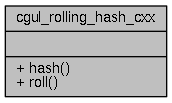C++ bindings for cgul_rolling_hash
More...
#include <cgul_rolling_hash_cxx.h>

Static Public Member Functions | |
| static cgul_uint32_t | hash (const char *block, size_t block_length) |
| static cgul_uint32_t | roll (cgul_uint32_t hv, const char c_old, const char c_new, size_t block_length) |
Detailed Description
This class provides the C++ bindings for cgul_rolling_hash. The main purpose of this class is to convert the C-style function calls and exception handling in cgul_rolling_hash into C++-style function calls and exception handling.
Member Function Documentation
§ hash()
|
inlinestatic |
This function calculates the hash value for length bytes in the block block. The main purpose of this function is to generate the initial hash value that can then be passed into roll(), but it can also be used as a stand-alone hash function.
- Parameters
-
[in] block block of binary data [in] block_length length of blockin bytes
- Returns
- hash value
- See also
- roll()
- cgul_hash_cxx::hash_block()
References cgul_rolling_hash__hash().
§ roll()
|
inlinestatic |
Peform a rolling hash calculation on the hash value hv by surgically removing the part of the hash value associated with the old character c_old that is being removed and adding the part of the hash value associated with the new character c_new that is being added. The initial value for hv should be obtained by calling hash(). The value for block_length should be same as what originally was passed into hash().
- Parameters
-
[in] hv old hash value [in] c_old old character [in] c_new new character [in] block_length length of the block in bytes
- Returns
- new hash value
- See also
- hash()
References cgul_rolling_hash__roll().
The documentation for this class was generated from the following file:
